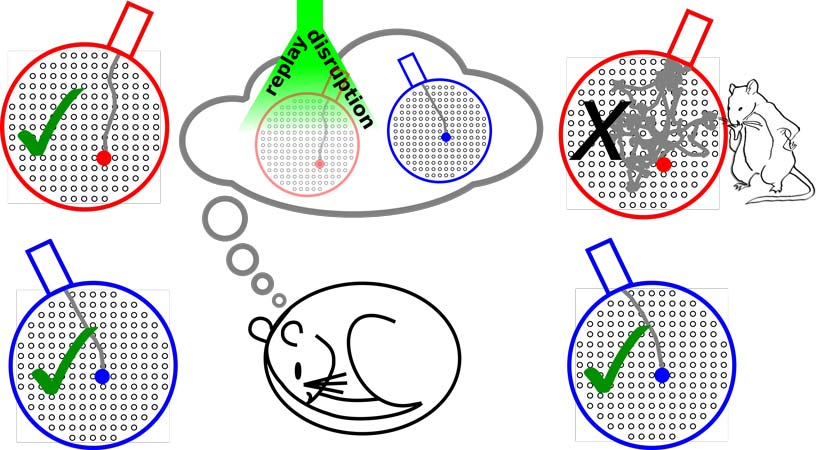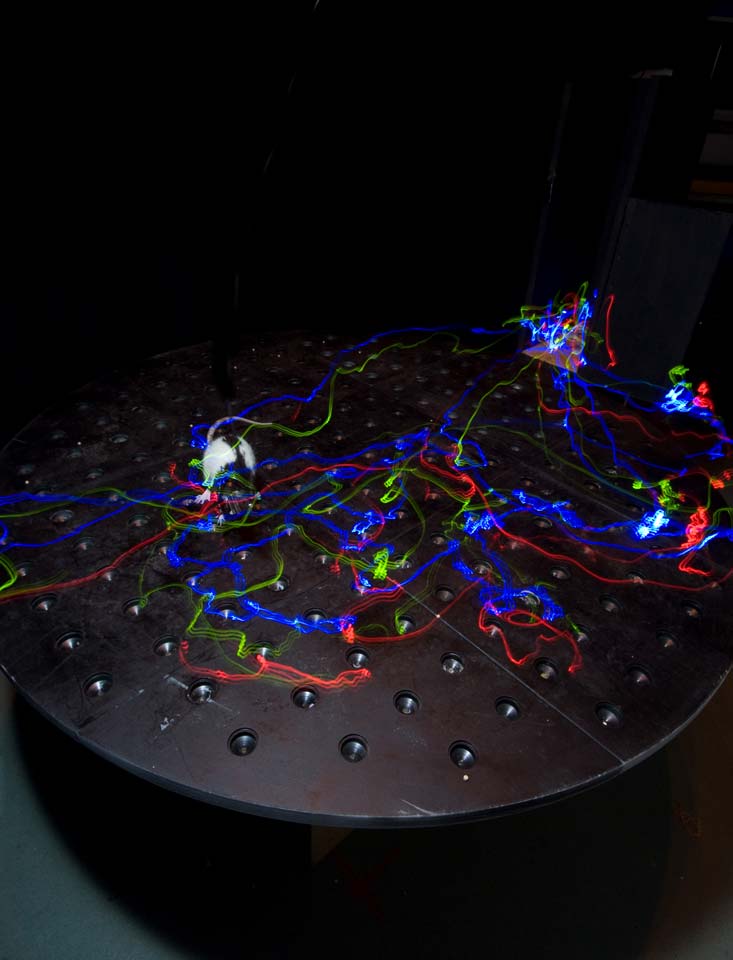February 17, 2020
The librarian of memory
Hippocampus finds correct memories – Study published in Neuron

When rats sleep, the brain region of the hippocampus replays neuronal activity to consolidate memories. By selectively disrupting this replay, neuroscientists at the Institute of Science and Technology Austria (IST Austria) found that the hippocampus acts as a librarian, retrieving a particular memory when the rat tries to recall it. This is the result of a study published in Neuron by the group of Professor Jozsef Csicsvari.
Professor Jozsef Csicsvari and his team at the Institute of Science and Technology Austria (IST Austria) are working with rats to find out how memories are made, stored and recalled. For their research, they use an experimental set-up called the “cheeseboard” maze, which resembles a slice of Emmental cheese. The holes of the cheeseboard are hiding places for food rewards, and rats learn where these rewards are located. In the past, Csicsvari and his group have shown that when rats learn a reward location on the cheeseboard, they replay this neuronal activity. That is, place cells—neurons in the hippocampus that fire when the animal is at a specific location—are active particularly at the reward location, and during sleep, the same combination of place cells becomes active.
Disruption of replay worsens memory
In the new study published, Jozsef Csicsvari and Igor Gridchyn, first author and postdoc in his group, wanted to test what happens when replay of a specific reward is disrupted. To do so, the rats learned the location of rewards on two different cheeseboards, A and B. When the rats slept, the researchers disrupted the replay of memories formed on cheeseboard A, but did not disrupt the replay of memories formed on cheeseboard B. For this, Gridchyn developed a computational method which decodes the activity of neurons in the sleeping rat’s brain and decides, within milliseconds, whether memory A or memory B is replayed.
When memory A was replayed, the neuronal activity was immediately disrupted using optogenetics, a method that can inhibit neurons using light. After sleep, the rats again searched for the food rewards, hidden in the same locations as before—and the disruptions had an effect: while rats found the reward on cheeseboard B, they had problems finding the reward on cheeseboard A. “The behavior of rats was worse when we disrupted replay during sleep, so the memory was worse. However, with our procedure, we were able to influence which memories the animal is able to recall,” explains Csicsvari.

© IST Austria – Csicsvari group
New insights into role of hippocampus
Additionally, the neuroscientists looked at how the disruption of replay affects place cells. At the end of a learning period, before the rat sleeps, certain place cells fire and represent the reward location on cheeseboard A, while another combination of place cells represents the reward location on cheeseboard B. When a rat tried to find rewards again on cheeseboard B, for which replay was not disrupted, the same group of place cells was active as at the end of learning. In case of cheeseboard A, for which replay was disrupted, the place cells that coded for the reward location no longer fired as the rat looked for the reward. But as the rat re-learned where the reward is hidden, the same combination of place cells again coded for the reward location. “What actually happens is that the disruption of replay didn’t erase the representation of memory itself. Instead, it prevented the reinstatement of appropriate representation, leading to recall impairment,” says Csicsvari.
The results have implications for the role of the hippocampus in memory formation. Csicsvari adds: “Hippocampal replay is not needed for the stabilization of memories; instead, it is needed for selecting the neural activity that encoded the appropriate memory during recall. When the animals relearned their memories, the same neuronal representation came back. This means that the representation was already stored after the disruption, but the animal couldn’t activate it. Thus, there needs to be a process not just to store the memory itself, but also a librarian to remember where the memory is. The hippocampus is this librarian.”
Publication
Igor Gridchyn, Philipp Schoenenberger, Joseph O’Neill & Jozsef Csicsvari. 2020. Assembly-specific disruption of hippocampal replay leads to selective memory deficit. Neuron. DOI: 10.1016/j.neuron.2020.01.021
Funding information
This work was supported by European Research Council Consolidator Grant no 281511.
Animal welfare
Understanding how the brain works is only possible by studying the brains of animals while they carry out specific behaviors. No other methods, such as in vitro or in silico models, can serve as alternatives. The animals were raised, kept and treated according to the strict regulations of Austrian and European law.



